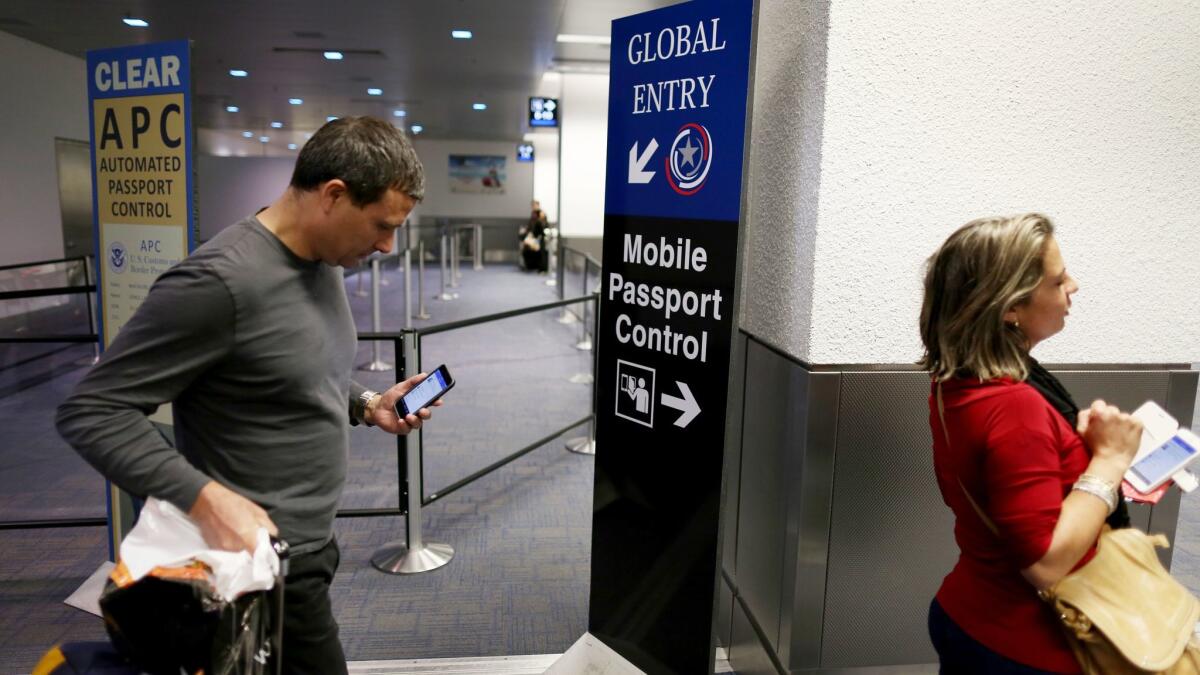U.S. dramatically increased searches of electronic devices at airports in 2017, alarming privacy advocates

Reporting from Washington — Border officers dramatically increased their searches last year of photos, social media messages, emails and private files kept on cellphones and other electronic devices carried by international travelers, including U.S. citizens, according to statistics released Friday.
Although fewer than 1% of travelers have their devices screened, the increase alarmed privacy advocates who say U.S. citizens should not lose their protections against warrantless searches when crossing the border.
Cellphones, laptops, tablets and other devices carried by 30,200 travelers were searched during the 2017 fiscal year, which ended last September, compared with 19,051 the year before, according to U.S. Customs and Border Protection.
The increase follows an even starker jump before that. Just 8,053 travelers had their devices searched in the 2015 fiscal year.
“In this digital age, border searches of electronic devices are essential to enforcing the law at the U.S. border and to protecting the American people,” said John Wagner, the CBP’s deputy executive assistant commissioner in charge of field operations.
Fewer than 20% of the travelers whose devices were searched were U.S. citizens, according to the agency, which did not make exact numbers available.
“The idea that they can be searched just by entering or leaving the country we are citizens of — it goes against the very thing the 4th Amendment was designed to protect against, which is arbitrary dragnet surveillance,” said Ryan Calo, law professor at the University of Washington in Seattle and an expert on privacy law.
In addition to releasing the statistics, officials detailed new guidelines for customs officers to clarify and circumscribe the broad authority the agency believes it has to search and copy information storied on U.S. citizens’ devices.
Officers can ask for passwords, although they’re required to destroy them after the search, according to the guidelines. Although they can review files on a device, they’re not permitted to search or access information stored on a digital cloud. Although data connections must be turned off during searches, officers can open social media applications to view any messages or posts that are visible.
In limited cases, officers can conduct an advanced search, which could allow them to download files for further review.
The American Civil Liberties Union, which has sued over what it describes as unconstitutional searches of electronic devices, said the tighter guidelines are helpful but inadequate.
“The policy would still enable officers at the border to manually sift through a traveler’s photos, emails, documents and other information stored on a device without individualized suspicion of any kind,” said Neema Singh Guliani, legislative counsel at the ACLU.
Courts have repeatedly held that 4th Amendment protections against unreasonable searches can be balanced at the border against the federal government’s need to protect the public from terrorism and crime.
But whether an American traveler’s electronic device can be searched at an airport or on the border has not been fully determined by the courts.
A 2014 Supreme Court ruling found that law enforcement agents must have a warrant to search a phone or computer when a person is being arrested. Privacy advocates argue that a U.S. citizen crossing the border should have at least the same rights as a person arrested under suspicion of a crime.
Searching the devices of Americans at the border is “problematic” and reflects “mission creep,” said James Norton, who was a senior official at the Department of Homeland Security during the George W. Bush administration.
Norton also is concerned that any data copied by customs officers at the border may be vulnerable to hackers, given that the federal government has failed to protect private information in the past.
Congress has been “delinquent” and needs to weigh in and define exactly how much search authority border officials have over American travelers and what limits are placed on how copied electronic information can be shared, Norton said.
Stewart Baker, senior policy official at the Department of Homeland Security from 2005 to 2009 and an expert on national security law, said there’s “nothing new” about searching electronic devices at the border.
“The basic principle is that however personal something is, it is subject to search at the border because it is necessary to decide whether to admit people and determine if they are carrying contraband,” he said.
A senior Customs official, who refused to be publicly identified discussing the statistics or guidelines, said there had been no formal decision to ramp up searches. Instead, the official said, more travelers have been carrying devices — sometimes multiple devices — leading to more searches.
Officials said the searches “have resulted in evidence helpful” for combating terrorism, child pornography, visa fraud and the trafficking of pirated movies, software and other types of protected intellectual property.
Twitter: @chrismegerian
Twitter: @ByBrianBennett
More to Read
Get the L.A. Times Politics newsletter
Deeply reported insights into legislation, politics and policy from Sacramento, Washington and beyond. In your inbox three times per week.
You may occasionally receive promotional content from the Los Angeles Times.












